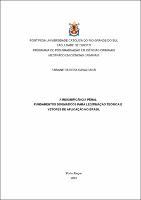| Share record |


|
Please use this identifier to cite or link to this item:
https://tede2.pucrs.br/tede2/handle/tede/6899Full metadata record
| DC Field | Value | Language |
|---|---|---|
| dc.creator | Cavalcanti, Fabiane da Rosa | - |
| dc.creator.Lattes | http://buscatextual.cnpq.br/buscatextual/visualizacv.do?id=K4893169H8 | por |
| dc.contributor.advisor1 | Gloeckner, Ricardo Jacobsen | - |
| dc.contributor.advisor1Lattes | http://buscatextual.cnpq.br/buscatextual/visualizacv.do?id=K4753013U9 | por |
| dc.date.accessioned | 2016-08-15T19:53:41Z | - |
| dc.date.issued | 2016-03-29 | - |
| dc.identifier.uri | http://tede2.pucrs.br/tede2/handle/tede/6899 | - |
| dc.description.resumo | Na presente dissertação, estuda-se o princípio da insignificância por meio de uma revisão doutrinária, voltada ao estudo multidisciplinar, aliada à pesquisa jurisprudencial e à análise de seis precedentes do Superior Tribunal de Justiça e do Supremo Tribunal Federal. Após a introdução, serão abordados, no primeiro capítulo, os movimentos de política criminal, as tensões entre o minimalismo e o maximalismo penal, a crescente expansão do direito penal e os limites do expansionismo na contemporaneidade. O primeiro capítulo ainda abordará os princípios da fragmentariedade, da subsidiariedade e da ofensividade como elementos legitimadores do princípio bagatelar, reforçando a aplicação do princípio da insignificância para a dogmática jurídico-penal. O segundo capítulo versa sobre a importância do bem jurídico e a sua interdependência com o princípio bagatelar. Será estudada a insignificância em sua essência como causa supralegal de atipicidade, com o objetivo de avaliar a proporcionalidade da sanção ao tipo incriminador. O final do estudo trará os vetores elencados pelo Supremo Tribunal Federal, no Habeas Corpus paradigmático n. 84.412 de 2004, e a análise realizada para verificar se a jurisprudência foi consolidada pelos Tribunais e se a aplicação do princípio da insignificância tornou-se viável nos moldes criados pelo STF. Nesse sentido, o terceiro capítulo tem a finalidade de comprovar, a partir da análise de seis precedentes que tratam de delitos de furto e de descaminho no Superior Tribunal de Justiça e do Supremo Tribunal Federal, a falha no modelo criado pela jurisprudência, constatando uma patologia do sistema de aplicação dos vetores do referido acórdão. Por fim, será estudado o Projeto de Lei n. 236 do Senado Federal, exclusivamente o ponto que trata dos princípios que o Projeto quer positivar, especialmente analisando-se o princípio bagatelar com o intuito de demonstrar que a forma de tipificação do princípio da insignificância na Parte Geral do Código Penal é equivocada e não representará nenhuma mudança significativa ao sistema jurídico penal brasileiro. | por |
| dc.description.abstract | In this dissertation, we study the de minimis non curat praetor principle through the review of the doctrine, focused on the multidisciplinary study, supported by the jurisprudential research and analysis of six precedents of the Superior Court of Justice and the Federal Supreme Court. After the introduction, in the first chapter, the criminal policy movements, the tensions between criminal minimalism and maximalism, the growing expansion of the criminal law and the limits of the expansionism in the contemporaneity will be addressed. The first chapter will also address the principles of fragmentarity, subsidiarity and offensiveness as legitimating elements of the de minimis postulate, thus strengthening the implementation of this principle for the criminal law dogmatics. The second chapter deals with the importance of the legal right and its interdependence with the de minimis principle. The insignificance will be studied in its essence as a supralegal cause of atypicity, in order to assess the proportionality of the sanction to the felony. Finally, the study will bring the vectors listed by the Federal Supreme Court in the paradigmatic Habeas Corpus n. 84.412 from 2004, and the analysis to verify if the precedent has been consolidated by the courts and if the de minimis non curat praetor principle became feasible in the manner established by the Federal Supreme Court. In this sense, the third chapter is intended to prove, from the analysis of six precedents dealing with theft and embezzlement offenses in the Superior Court of Justice and in the Federal Supreme Court, the flaw in the model created by the jurisprudence, finding a pathology in the system of application of the vectors from the referred decision. Finally, the Bill no. 236 of the Senate will be studied, exclusively in reference to the principles that it wants to consolidate, especially analyzing the de minimis postulate in order to demonstrate that the form of consolidating this principle in the General Part of the Penal Code is flawed and will represent no significant changes to the Brazilian criminal justice system. | eng |
| dc.description.provenance | Submitted by Setor de Tratamento da Informação - BC/PUCRS ([email protected]) on 2016-08-15T19:53:41Z No. of bitstreams: 1 DIS_FABIANE_DA_ROSA_CAVALCANTI_PARCIAL.pdf: 193888 bytes, checksum: 94c6fea77c93f7d4106e0966ea265312 (MD5) | eng |
| dc.description.provenance | Made available in DSpace on 2016-08-15T19:53:41Z (GMT). No. of bitstreams: 1 DIS_FABIANE_DA_ROSA_CAVALCANTI_PARCIAL.pdf: 193888 bytes, checksum: 94c6fea77c93f7d4106e0966ea265312 (MD5) Previous issue date: 2016-03-29 | eng |
| dc.format | application/pdf | * |
| dc.thumbnail.url | http://tede2.pucrs.br:80/tede2/retrieve/165999/DIS_FABIANE_DA_ROSA_CAVALCANTI_PARCIAL.pdf.jpg | * |
| dc.language | por | por |
| dc.publisher | Pontifícia Universidade Católica do Rio Grande do Sul | por |
| dc.publisher.department | Faculdade de Direito | por |
| dc.publisher.country | Brasil | por |
| dc.publisher.initials | PUCRS | por |
| dc.publisher.program | Programa de Pós-Graduação em Ciências Criminais | por |
| dc.rights | Acesso Aberto | por |
| dc.subject | INSIGNIFICÂNCIA (DIREITO) | por |
| dc.subject | POLÍTICA CRIMINAL - BRASIL | por |
| dc.subject | DIREITO PENAL | por |
| dc.subject.cnpq | CIENCIAS SOCIAIS APLICADAS::DIREITO | por |
| dc.title | A insignificância penal : fundamentos dogmáticos para a legitimação teórica e vetores de aplicação no Brasil | por |
| dc.type | Dissertação | por |
| Appears in Collections: | Programa de Pós-Graduação em Ciências Criminais | |
Files in This Item:
| File | Description | Size | Format | |
|---|---|---|---|---|
| DIS_FABIANE_DA_ROSA_CAVALCANTI_PARCIAL.pdf | Texto Parcial | 189.34 kB | Adobe PDF |  Download/Open Preview |
Items in DSpace are protected by copyright, with all rights reserved, unless otherwise indicated.




